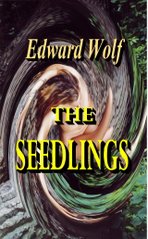As the old axiom goes, the pessimist sees the glass half empty, while the optimist see it half full. The reality, of course, is that the glass is always full to overflowing—the bottom half with liquid, the top half with air.
If you think about it, it is the half you don’t see—the odorless, colorless, tasteless, invisible gas—that is most vital to us. We can live several days without liquid, but only a few minutes without air. And the more liquid we put into the glass, the less room we have for air.
Essentially, this is true with all of life. It’s not the tangible things, such as our homes and our cars, which determine our happiness, but the unseen forces like love and accomplishment which bring us the most joy and fulfillment.
The next time you look at your bank account and feel your life is only partially full or mostly empty, take a second look. You will probably discover your life is overflowing with those things you need most.
Click her for books by Edward Wolf. Downloads from $1.25.
Wednesday, January 31, 2007
Monday, January 29, 2007
WHY NINJA TURTLES?

Many years ago, I was working on a theory of Simultaneous Conflicting Realities. That is: the idea that something can both exist and not exist at the same time. While I can not see how anything can exist and not exist simultaneously in a singular reality, it is only an unproven assumption that we all exist in only one reality.
Let’s say for instance you believe in UFOs, and I don’t. Isn’t it possible that for you, in your reality, UFOs do exist, while for me, in my reality, they don’t?
Could this possibly explain why some people can do things, such as witch water, while others of us can’t? Could this possibly explain why some people see UFOs while others can’t? Could this possibly explain why some people see things most of the rest of us consider hallucinations?
As a simple illustration, I created three overlapping circles representing three different people: person A, person B, and person C.
At the time, when I had them all filled in with colors, they looked, to me, like the face of a ninja turtle.
However, this is how the diagram works. You will notice that there is a common reality, ABC, we all share. But there are also realities exclusive to each A, B, and C, and realities shared only by A and B, A and C, and B and C.
As a result, perhaps UFOs, or any other phenomena, actually exist, quite literally, for persons A and B, but do not exist for person C.
In “The Crack in the Cosmic Egg,” author Joseph Chilton Pearce suggests that we create reality as we go, even offering the hypothesis that sub-atomic particles did not exist until we went looking for them. If this is so, isn’t it possible that some people create reality faster than others? Isn’t it also possible that some people can create a non-reality in which things common to most people do not exist?
Let’s say for instance you believe in UFOs, and I don’t. Isn’t it possible that for you, in your reality, UFOs do exist, while for me, in my reality, they don’t?
Could this possibly explain why some people can do things, such as witch water, while others of us can’t? Could this possibly explain why some people see UFOs while others can’t? Could this possibly explain why some people see things most of the rest of us consider hallucinations?
As a simple illustration, I created three overlapping circles representing three different people: person A, person B, and person C.
At the time, when I had them all filled in with colors, they looked, to me, like the face of a ninja turtle.
However, this is how the diagram works. You will notice that there is a common reality, ABC, we all share. But there are also realities exclusive to each A, B, and C, and realities shared only by A and B, A and C, and B and C.
As a result, perhaps UFOs, or any other phenomena, actually exist, quite literally, for persons A and B, but do not exist for person C.
In “The Crack in the Cosmic Egg,” author Joseph Chilton Pearce suggests that we create reality as we go, even offering the hypothesis that sub-atomic particles did not exist until we went looking for them. If this is so, isn’t it possible that some people create reality faster than others? Isn’t it also possible that some people can create a non-reality in which things common to most people do not exist?
Sunday, June 12, 2005
Thursday, June 09, 2005
Are We Spirit in Material Form, or Are We Spirit Imagining a Material Form?
In “Hidden Messages in Water” the author alters water crystal construction by giving water various messages. If valid, that implies one of the following:
1. Matter has intelligence.
2. Matter has no intelligence, but we have the ability to manipulate matter.
3. Matter has intelligence, and we have the ability to manipulate (communicate with) it.
4. Matter is only an illusion—therefore the universe and everything in it is an illusion, and
everything we experience is a dream.
Current concept is that matter has no intelligence, and that we bring intelligence to it. That is, a body with no life has no intelligence. But, on the other hand, what if “death” is nothing more than us (our spirits) ceasing instructions for animation to that matter which composes our body? After all, the body continues to do work, that is change, after death. But does it do this in the absence of an observer?
But if we can manipulate matter, how could we manipulate, that is: communicate with it, instruct it, if it has no intelligence; unless it were all an illusion?
Does matter exist without an observer?
If matter exists without an observer, that might imply that matter has intelligence.
If it doesn’t, that might imply that it is an illusion.
But to look at it another way, if the energy of the universe has intelligence, then all matter in the universe must also have intelligence.
So is the energy of the universe intelligent, or do we bring intelligence in to it, or is it all just an illusion?
To say that inert matter has no intelligence would be the same as saying there are two types of energy in the universe, intelligent--conscious (us) and non-intelligent—non-conscious (matter). Which is the same thing as saying that intelligence, or consciousness, is separate from the universe; that without life, there would be no intelligence in the universe. Or that, the universe is only an illusion.
That still brings us back to the same question: Is the universe illusion, or does it exist separate from our experience of it? Or, is the universe a “thought form?” That is, we use thought (energy) to create a material object, once that object is created, it exists in ever-changing form until it is destroyed by another (perhaps stronger) thought—which could be nothing more than the realization that it is only a thought form.
How might I differentiate between illusion and “thought form?” Although a “thought form” is a type of illusion, it is an illusion that converts energy into matter within the context of the experience, real or imagined, of a material existence, while pure illusion takes no material form.
We are still back to the question: are we spirit in material form (just as matter is energy in “frozen form” as Einstein would say), or are we spirit imagining a material experience?
1. Matter has intelligence.
2. Matter has no intelligence, but we have the ability to manipulate matter.
3. Matter has intelligence, and we have the ability to manipulate (communicate with) it.
4. Matter is only an illusion—therefore the universe and everything in it is an illusion, and
everything we experience is a dream.
Current concept is that matter has no intelligence, and that we bring intelligence to it. That is, a body with no life has no intelligence. But, on the other hand, what if “death” is nothing more than us (our spirits) ceasing instructions for animation to that matter which composes our body? After all, the body continues to do work, that is change, after death. But does it do this in the absence of an observer?
But if we can manipulate matter, how could we manipulate, that is: communicate with it, instruct it, if it has no intelligence; unless it were all an illusion?
Does matter exist without an observer?
If matter exists without an observer, that might imply that matter has intelligence.
If it doesn’t, that might imply that it is an illusion.
But to look at it another way, if the energy of the universe has intelligence, then all matter in the universe must also have intelligence.
So is the energy of the universe intelligent, or do we bring intelligence in to it, or is it all just an illusion?
To say that inert matter has no intelligence would be the same as saying there are two types of energy in the universe, intelligent--conscious (us) and non-intelligent—non-conscious (matter). Which is the same thing as saying that intelligence, or consciousness, is separate from the universe; that without life, there would be no intelligence in the universe. Or that, the universe is only an illusion.
That still brings us back to the same question: Is the universe illusion, or does it exist separate from our experience of it? Or, is the universe a “thought form?” That is, we use thought (energy) to create a material object, once that object is created, it exists in ever-changing form until it is destroyed by another (perhaps stronger) thought—which could be nothing more than the realization that it is only a thought form.
How might I differentiate between illusion and “thought form?” Although a “thought form” is a type of illusion, it is an illusion that converts energy into matter within the context of the experience, real or imagined, of a material existence, while pure illusion takes no material form.
We are still back to the question: are we spirit in material form (just as matter is energy in “frozen form” as Einstein would say), or are we spirit imagining a material experience?
Subscribe to:
Comments (Atom)



